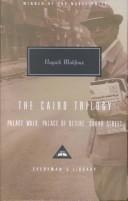nicknicknicknick@bookwyrm.social ha recensito The Cairo Trilogy di Naguib Mahfouz
The Cairo Trilogy
5 stelle
Avviso sul contenuto spoilers, lotta text.
1) "She woke at midnight. She always woke up then without having to rely on an alarm clock. A wish that had taken root in her awoke her with great accuracy. For a few moments she was not sure she was awake. Images from her dreams and perceptions mixed together in her mind. She was troubled by anxiety before opening her eyes, afraid sleep had deceived her. Shaking her head gently, she gazed at the total darkness of the room. There was no clue by which to judge the time. The street noise outside her room would continue until dawn. She could hear the babble of voices from the coffeehouses and bars, whether it was early evening, midnight, or just before daybreak. She had no evidence to rely on except her intuition, like a conscious clock hand, and the silence encompassing the house, which revealed that her husband had not yet rapped at the door and that the tip of his stick had not yet struck against the steps of the staircase. Habit woke her at this hour. It was an old habit she had developed when young and it had stayed with her as she matured. She had learned it along with the other rules of married life. She woke up at midnight to await her husband's return from his evening's entertainment. Then she would serve him until he went to sleep. She sat up in bed resolutely to overcome the temptation posed by sleep. After invoking the name of God, she slipped out from under the covers and onto the floor. Groping her way to the door, she guided herself by the bedpost and a panel of the window. As she opened the door, faint rays of light filtered in from a lamp set on a bracketed shelf in the sitting room. She went to fetch it, and the glass projected onto the ceiling a trembling circle of pale light hemmed in by darkness. She placed the lamp on the table by the sofa. The light shone throughout the room, revealing the large, square floor, high walls, and ceiling with parallel beams. The quality of the furnishings was evident: the Shiraz carpet, large brass bed, massive armoire, and long sofa draped with a small rug in a patchwork design of different motifs and colors."
2) "She could not keep herself from saying with a laugh, 'What a man you are! On the outside you are dignified and pious, but inside you're licentious and debauched. Now I really believe what I was told about you.' Al-Sayyid Ahmad sat up with interest and asked, 'What were you told? ... May God spare us the evil of what people say.' 'They told me you're a womanizer and a heavy drinker.' He sighed audibly in relief and commented, 'I thought it would be criticism of some fault, thank God.'"
3) "She was filled with resentment and anger but concealed that deep inside her so as not to appear displeased by her sister's happiness. She did not care to expose herself, as her suspicious nature made her think she might, to the abuse of anyone wishing to revile her. In any case, there was no alternative to suppression of her emotions, because in this family that was an ingrained custom and a moral imperative established by threat of paternal terror. Between her hatred and resentment on one side and concealment and pretended delight on the other, her life was a continual torment and an uninterrupted effort."
4) "Although members of this family, like most other people, were subject to feelings of anger, they never were so afflicted that their hearts were hostile in a consistent or deep-rooted fashion. Some of them had a capacity for anger like that of alcohol for combustion, but their anger would be quickly extinguished. Then their souls would be tranquil and their hearts full of forgiveness. Similarly in Cairo, during the winter, the sky can be gloomy with clouds and it even drizzles, but in an hour or less the clouds will have scattered to reveal a pure blue sky and a laughing sun."
5) "'You should be serious about serious things and playful when you play. There's an hour for your Lord and an hour for your heart.'"
6) "The breakfast group broke up. Al-Sayyid Ahmad retired to his room. The mother and Zaynab were soon busy with their daily chores. Since it was a sunny day with warm spring breezes, one of the last of March, the three brothers went up on the roof, where they sat under the arbor of hyacinth beans and jasmine. Kamal got interested in the chickens and settled down by their coop. He scattered grain for them and then chased them, delighted with their squawking. He picked up the eggs he found. His brothers began to discuss the thrilling news that was spreading by word of mouth. A revolution was raging in all areas of the Nile Valley from the extreme north to the extreme south. Fahmy recounted what he knew about the railroads and telegraph and telephone lines being cut, the outbreak of demonstrations in different provinces, the battles between the English and the revolutionaries, the massacres, the martyrs, the nationalist funerals with processions with tens of coffins at a time, and the capital city with its students, workers, and attorneys on strike, where transportation was limited to carts."
7) "Once the revolution knocked on his door, threatened his peace and security and the lives of his children, its flavor, complexion, and import were transformed into folly, madness, unruliness, and vulgarity. The revolution should rage on outside. He would participate in it with all his heart and donate to it as generously as he could. ... He had done that. But the house was his and his alone. Any member of his household who talked himself into participating in the revolution was in rebellion against him, not against the English."
8) "He felt temptation inside and outside him. But which was the voice and which the echo? Even more marvelous was the life throbbing in material objects around them. The flowerpots whispered as they rocked back and forth. The pillars exchanged secrets. As the sky gazed down with starry, sleep-filled eyes at the earth, it spoke. He and his companion exchanged messages expressing their inmost feelings while a glow, both visible and invisible, confounded their hearts and dazzled their eyes. Something was at work in the world, tickling people until they were plunged into laughter. A look, word, gesture, anything was enough to induce all of them to laugh. Time fled as quickly as youth. The waiters carrying the fermented germ of exuberance distributed it to all the tables with grave faces. The tunes of the piano seemed to come from far away and were almost drowned out by the clattering wheels of the streetcar. On the sidewalk rowdy boys and men collecting cigarette butts created a commotion like the drone of flies, as night's legions set up camp in the district."
9) "In the shadows he had no hesitation or embarrassment about talking to himself. The canopy of branches shielded him from the sky, the fields stretching off to his right absorbed his ideas, and the waters of the Nile, flowing past him on the left, swallowed his feelings. But he had to avoid the light. He needed to be careful not to get caught by its bright ring, for fear of having to take off like a circus wagon trailed by boys and curiosity seekers. Then he could kiss his reputation, dignity, and honor goodbye. He had two personalities. One was reserved for friends and lovers, the other presented to his family and the world. It was this second visage that sustained his distinction and respectability, guaranteeing him a status beyond normal aspirations. But his caprice was conspiring against the respectable side of his character, threatening to destroy it forever. He saw the bridge with its glowing lights ahead of him and wondered where he should go. Since he wanted more solitude and darkness, he did not cross over but continued straight ahead, taking the Giza road."
10) "They all laughed. Kamal removed his spectacles and began to clean the lenses. He was capable of losing himself rapidly in a conversation, especially if he liked the person and if the atmosphere was relaxed and pleasant. Kamal said, 'I'm a tourist in a museum where nothing belongs to me. I'm merely a historian. I don't know where I stand.'"
11) "Shortly thereafter the all-clear siren sounded, and the shelter's denizens voiced a profound sigh of relief. Kamal said, 'The Italians were just teasing us.' They left the shelter in the dark, like bats, as doors emitted one ghostly figure after another. Then a faint glimmer of light could be seen coming from windows, and the world resumed its normal commotion. In this brief moment of darkness, life had reminded careless people of its incomparable value."
12) "'I consent to your conditions. But let me tell you frankly that I was hoping to win an affectionate woman, not merely an analytical mind.' As her eyes followed the swimming duck, she asked, 'To tell you that she loves you and will marry you?' 'Yes!' She laughed and inquired, 'Do you think I'd discuss the details if I had not agreed in principle?' He squeezed her hand gently, and she added, 'You know it all. You just want to hear it.' 'I'll never grow tired of hearing it.'"
13) "Turning to the silent bride, Sawsan asked affectionately, 'What does Karima think about her husband's beard?' Karima hid her laughter by ducking her crowned head but said nothing. Zanuba answered for her, 'Few young men are as pious as Abd al-Muni'm.' Khadija remarked, 'I admire his piety, which is a characteristic of our family, but not his beard.' Laughing, Ibrahim Shawkat said, 'I must acknowledge that both my sons - the Believer and the apostate - are crazy.' Yasin roared his mighty laugh and commented, 'Insanity is also a characteristic of our family.'"
14) "'She's paralyzed, and the doctor says it will all be over in three days.' Riyad looked glum and inquired, 'Can't anything be done?' Kamal shook his head disconsolately and remarked, 'Perhaps it's lucky that she's unconscious and knows nothing of the destiny awaiting her.' When they were seated, he added in an ironic tone,'But who among us knows what destiny awaits us?' Riyad smiled without replying. Then Kamal continued: 'Many think it wise to make of death an occasion for reflection on death, when in truth we ought to use it to reflect on life.'"
15) "He told the man, when Yasin was finished, 'A black necktie, please.' Each one took his package, and they left the store. The setting of the sun was washing the world with a sepia tint as side by side they walked back to the house."

